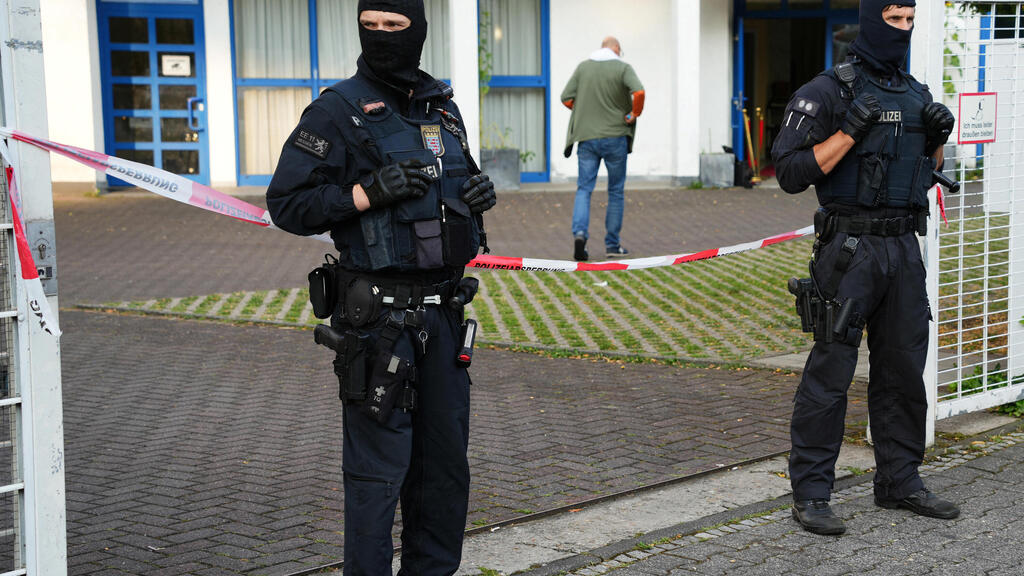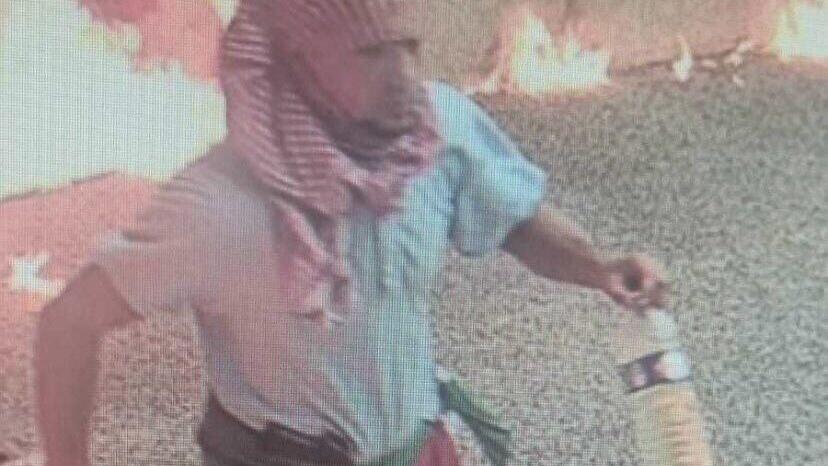Getting your Trinity Audio player ready...
Since October 7, there has been a remarkable growth in registered cases of antisemitism worldwide, with a notorious potential for violence that becomes a reality in many cases. Most recently, last week, the French police arrested a suspect over a fire attack on a synagogue in Nîmes, in southern France, an act that experts described as the profile the Islamist group seeks to recruit.
With the situation between Israel and Hezbollah locked into a dangerous escalation, the Islamist terror organization continues to attack Israel directly, and many experts see increased risks for Jewish communities in the diaspora as well.
Former INTERPOL Director Chief Superintendent (Ret.) Asher Ben Artzi explained that the assassination of Fouad Shuker opened a power struggle within Hezbollah that could lead to an intensification of attacks against Jews outside Israel. “There has been an intense fighting within Hezbollah’s leadership to determine who will be closest to (Hassan) Nasrallah,” he explained. “This struggle has significantly impacted the elite Radwan unit, particularly after the loss of its senior commanders. Talal Hamiyah is the leading candidate to replace Fuad (Shukr). As the commander of Unit 910, Hezbollah’s overseas terror attack unit, Hamiyah was responsible for the attacks on the Jewish community in Argentina.”
Among the most remarkable cases of Hezbollah’s terror against Jews outside of Israel includes the AMIA bombing in July 1994 in Argentina, leaving 85 dead and more than 300 injured. Following up with Argentina’s investigations on the AMIA bombing, Alberto Nisman, an Argentinean Jew who was the prosecutor working on investigating the AMIA case, was mysteriously found dead in 2004.
In many countries, governments have responded by providing additional resources to protect these institutions, recognizing the growing threat.
Chief Operating Officer for the Latin American Jewish Congress Danilo Gelman said that the initial rise of antisemitism on October 7, coupled with threats from Iran and Hezbollah, is having multiple impacts on Jewish communities globally, especially concerning their security. “These communities have seen the need to increase protective measures at synagogues, schools, and community centers, hire private security personnel, install surveillance systems, and work closely with local law enforcement. In many countries, governments have responded by providing additional resources to protect these institutions, recognizing the growing threat," he said. "There was a notable rise in acts of vandalism, threats, and assaults against Jewish communities, synagogues, and community centers in various countries across the region. This increase was particularly evident in countries with large Jewish populations, such as Argentina and Brazil.”
In 2017, the US added Hamiyah to its Rewards for Justice Program, offering $7 million for information leading to his arrest. In another case, in November 2023, the Brazilian Federal Police arrested eleven individuals recruited and radicalized by Hezbollah along with their plans to attack Jewish people and organizations in Brazil.
With such a dangerous prospect, Universidad del Norte in Colombia Professor Janiel Melamed said how Hezbollah, as a proxy actor in the Iranian hybrid warfare, is leveraging Its presence in Latin America. “Although this region is not an area of armed operations for Hezbollah, it is a key scenario for its funding, expansion, and strategic projection," he said.
"There has been a presence in the triple border between Argentina, Brazil, and Paraguay since long ago, which has influenced terrorist attacks against Jewish and Israeli targets. The new triple border between Colombia, Panama, and Venezuela has gained strategic importance due to the association and criminal cooperation with several local armed structures, including drug dealing.”
Closer to Israel, at the peak of the escalation with Hezbollah, Hassan Nasrallah, the leader of the terror group, has escalated threats against Cyprus, heightening the tensions of the ongoing war in Gaza, suggesting that the terror organization would also attack non-Jewish or Israeli targets if they support Israel, a strategy already applied by other terror organizations. Cyprus, the closest European country to the Middle East conflict zone, has strong military ties with Israel, further complicating the situation. Another ally of Israel that was recently targeted was Germany, with a knife attack motivated by Islamic State group ideology that left three dead and eight wounded at a city festival.
Austria is very concerned about the radicalization of Muslims by the Iranian regime and its proxies. Any activities and even the use of Hezbollah symbols are prohibited under Austrian law.
Concerns around Jewish communities can also be seen throughout Europe, where 10% of the global Jewish population lives. The Jewish-Austrian MP, Martin Engelberg, said that the Jewish community in Austria, although a heightened strain can be observed, Jewish life goes on as usual, with no restrictions on any activities such as religious services, schools, and even street parties, adding, “Austria is very concerned about the radicalization of Muslims by the Iranian regime and its proxies. Any activities and even the use of Hezbollah symbols are prohibited under Austrian law.”
Engelberg highlighted that Austrian authorities “observe the recruitment and radicalization of Muslims in Europe and Austria with great concern. Unfortunately, the recruiting and radicalization have often moved from mosques—where the activities could be somehow observed—to mainly social media and from organized groups to more lone wolf attackers like recently in Germany.” In light of these concerns, Engelber also explained that security measures for Jewish communities are already in place in Austria.
3 View gallery


German police during a raid of a mosque supporting Hezbollah
(Photo: Maximilian Schwarz / Reuters )
“The already existing, very strong security measures for the Jewish communities in Austria have been further increased. Police, the Austrian military, and security personnel of the Jewish communities cooperate closely to provide security for the Jewish communities,” he detailed. Unfortunately, Austria has also observed an increase in antisemitic incidents since October 7, albeit to a much smaller extent than in many other European countries.
“On the other hand, Austria is fully committed to its fight against any form of antisemitism. The Austrian government and the parliament have also been expressing solidarity with Israel, condemning the horrible attacks on October 7th and supporting Israel’s right to self-defense,” said Engelberg.
Many people fail to understand the deep connection most Jewish people have with their ancestral homeland.
In Ireland, one of the European countries recently recognizing Palestinian statehood, Maurice Cohen, chair of the Jewish Representative Council of Ireland, said. “Indeed, there has been a noticeable uptick, primarily in incidents related to anti-Zionism and anti-Israel sentiments. Many people fail to understand the deep connection most Jewish people have with their ancestral homeland.” To the Jewish-Irish leadership, there are always concerns, and “we have a close relationship with the local police at the highest level who have strengthened their vigilance as have the Jewish Institutions. Of course, we can’t discuss the security details of our community.”
Daniel Bloch, the Executive Director of the South African Board of Deputies in Cape Town, explained that in the past ten years, South Africa had approximately six reported incidents of physical violence against Jews; however, the same numbers were reported between October and December of 2023.
“Over the past few months, though, we have seen a decrease in antisemitic rhetoric. Since the horrific events of October 7th, antisemitism in South Africa has risen more than 600%. Most of the rhetoric has been online (social media). There have been a few reports of antisemitic graffiti, and some members of the community have been verbally attacked. It is important to note that we have only registered a handful of physical incidents where Jewish individuals have been assaulted,” Bloch said.
Executive Director of the Israel Brazil Institute (IBI), Dr. Manoela Miklos, explained the apparent discrepancy in how Jewish communities manage their actual and perceived risks: “The Brazilian Jewish community has been dealing with an increase in denounced antisemitic cases. I say it like this because I don’t think that antisemitism has increased," he said.
"It was always there; now, people feel comfortable enough to express it. There is no embarrassment anymore in being an antisemite. I say this because, suddenly, right after October 7, lots of people already had knowledge and familiarity with antisemitic ideas. They didn’t start learning those ideas after that day. They already knew what to say to offend the Jews, and lots of people felt it was acceptable to say those things after October 7. The only positive thing is that now we know the actual size of the problem and can act on it accordingly.”
In 2023, the Brazilian Federal Police arrested multiple Brazilians who had been recruited and radicalized by Hezbollah to commit acts of terror against Jewish communities in the South American country. “Cases like this increase the feeling of insecurity, but it’s hard to know the real impact. It’s difficult to talk about this without causing any kind of disrespect. There is also a lot of islamophobia in the world, so this is a challenging subject because that also happens to be very urgent,” Miklos said to TML.
Although these threats are concerning, in Brazil, the Jewish community’s most stressful point is the structural antisemitism and its global condition, according to her. “I find it difficult that Hezbollah would attack the Brazilian Jewish community. Still, the risk feels much more imminent, like the difference between measuring the temperature and a heat index on a hot day,” she noted.
“That said, it doesn’t look like Hezbollah activities are on the border between Brazil, Argentina, and Paraguay. But the situation needs monitoring since terrorists hiding in that area have committed terror attacks before. Although it looks like it’s a remote possibility, it has already happened, and back then, it also looked like it was a remote possibility.”
In South Africa, a country whose foreign policy has been remarkably anti-Israel, while certain members of the government may not be concerned with antisemitism, the local community works closely with other local government leaders within the various cities to combat antisemitism and protect the community. “We have very good relationships with the various security clusters in South Africa. We will continue to work together to protect our community and all communities affected by crime and other security-related issues,” Bloch shared with TML.
Hezbollah is an extension of the Iranian theocratic regime. It is not simply that it is aligned with its interests, but beyond.
Professor Melamed explained that Hezbollah is organically attracted to local individuals expressing antisemitic and anti-Israel ideas to recruit, radicalize, and make sure the person commits an act of terror. Melamed noted specifically: “Hezbollah is an extension of the Iranian theocratic regime. It is not simply that it is aligned with its interests, but beyond.”
3 View gallery


South African prosecutors at the ICJ case against Israel
(Photo: Yves Herman / Reuters)
“It’s integrated with it, consolidating itself as the main tool of non-state armed pressure to achieve Iran’s strategic interests. In developing its objectives, Hezbollah rapidly expanded and transformed. In a short time, it went from being a transnational armed actor to becoming a transcontinental organization with a presence in Europe, Africa, and East Asia," he said.
"In this expansion process, Latin America also became a significant theater of operations in developing its activities. In their recruiting, being a Muslim is certainly a desired aspect, but it isn’t mandatory. Aligning with antisemitic ideas is enough for Hezbollah to try to recruit someone if there isn’t a large Muslim community for them to draw human resources from.”
“In contrast,” Professor Melamed continued, “Hezbollah’s recruitment methods in France and Europe as a whole, where there is a large Muslim population, take on a different dimension. There, the group has access to a broader base of potential recruits who already share a cultural or religious identity that can be more easily aligned with Hezbollah’s radical ideology.”
“The existence of established Muslim communities allows Hezbollah to infiltrate and influence through social networks, religious institutions, and local grievances. This enables them to recruit not just individuals driven by antisemitism, but also those who may already harbor anti-Western or anti-Israel sentiments and can be radicalized to commit acts of terror.”
Story reprinted with the permission of The Media Line


